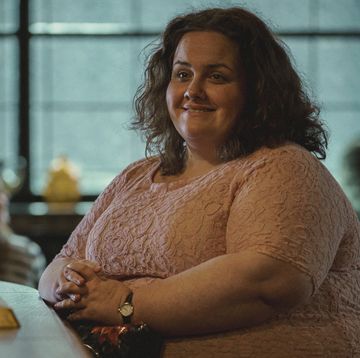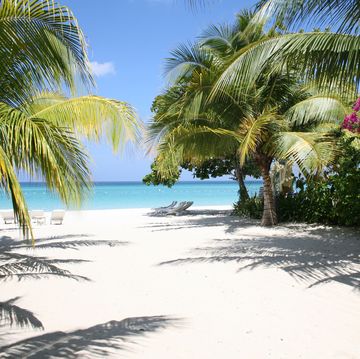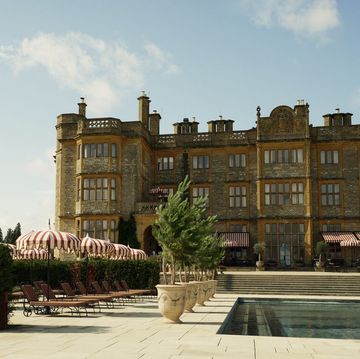Last year, I decided to go to Los Angeles on a short holiday. It would be great: I'd rent a little Airbnb in Venice, ride my bike to the beach every day, and work on the book I was writing while drinking turmeric iced tea. I had enough air miles to cover the flight (I live in New York), and it was easy for me to take the time off work. I bought the tickets. I reserved the accommodation. And then — only then — did I remember to tell my boyfriend. Who I lived with.
'I'm going to Los Angeles in May!' I said. 'Can you look after the dog?'
'I guess so?' he said, looking a little crestfallen. 'Should I have mentioned this before I booked the flights?' 'You could have,' he said. He had a point, but I'm new to this. Some people might say that this was a sign that I'm thoughtless. But I think it's because — OK, this is a term I just coined, but bear with me — I'm culturally single.
I was used to making travel plans alone – I'd done it for most of a decade. So I didn't think it was so bad that I forgot to discuss this trip with my boyfriend ahead of time. I was just behaving as I had when I was single because that had become my default way of being. To be culturally single is to have a strong sense of single identity, regardless of your relationship status. It means that you re- gard whether or not you're in a romantic relationship as moot when it comes to who you are or the direction of your life. It means that you don't see a relationship as a peak life experience. It means that you don't see being single as a problem to be solved.
The first time I told my boyfriend I was culturally single, it was an excuse for not thinking of him when I made a plan for myself, but when I shared it with friends, many agreed that they were culturally single, too. These were women who'd been single for a long time and learned to plan and enjoy their lives with the assumption that they'd be doing everything for themselves. Some, like me, have ended up with partners anyway. Some haven't.
This state of being has led me to many places but, in particular, to weddings – 37, to be precise. 'I've been to 37 of these,' I say, if the chat at Table 7 lulls, and this leads to gasps. Everyone likes a wedding, or in theory everyone does, but 37 is a lot of weddings to have attended by the age of 36, particularly when — like me — you've attended most of them, maybe 32, without a date.
For most of those 37 weddings, my invitation said 'Jean Hannah Edelstein and guest' because, at best, my friends and relatives who were celebrating their eternal love hoped that I might at least have been sleeping with someone who I'd like to be seen with in public. Maybe the fact that I had so many invitations and so few presentable boyfriends was not unconnected. Being without a partner meant that I had more time to devote to friendships. More friendships means more wedding invitations. And, OK, maybe more friendships also means less time to find a relationship.
I haven't always been culturally single. In my teens and early twenties, I was a committed serial monogamist. The longest gap between boyfriends was 10 days. Like many young women, I understood that being partnered was the default way of living. When my third boyfriend and I split up just before my 24th birthday, I was devastated, but I also assumed that I'd be in another serious relationship in a matter of weeks. I assumed that I was a relationship person; you could say that I was culturally coupled.
But I didn't walk straight into another serious relationship. Maybe it was because of my age. Maybe it was because I was living in a foreign city (London) where I didn't quite understand how to navigate the romantic landscape. In any case, bereft of a partner and the trappings of a partnered existence — someone with whom I could split bills and share holidays, someone to listen to me while I cried and tell me that my new haircut wasn't that bad — I began to see single life as a default life.
This doesn't mean that I was celibate or all alone – quite often I'd be seeing someone while looking for someone else – but my lack of a consistent or committed partner for all that time meant that I learned not to see a relationship as a normal way of living, or even an aspirational one.
This went against the societal norm at the time. I was 19 when the first Bridget Jones film came out, and from that I learned that to be a single woman in her early thirties was to be both incompetent at dealing with life and frantic about finding a man. But that was 2001.
In 2017, 32-year-old single women may still weather snide remarks from parents or smug marrieds about their lack of husbands. But they will also have no lack of friends who are choosing to be single and embracing single culture wholeheartedly. Rebecca Traister's 2016 book All The Single Ladies: Unmarried Women and the Rise of an Independent Nation was an excellent example of how much power single women have today, not only on the dating scene, but socioeconomically and politically. According to Traister, women who are single hold 51% of all management positions in the US.
Being culturally single is not about being without a partner, or being independent, or having casual sex with strangers and not feeling bad about it (though, yes, it can be about that). It's a lifestyle that focuses on using your resources on yourself and your non-romantic relationships. It means investing in different types of bonds with people, and having the kind of resilience to move on if necessary. It's about self-reliance. I had no partner to consult when I was making a decision, which was good when the decision was easy and not so good when the decision was difficult. No one was waiting for me at home.
Though I would sometimes wake in the night to consider whether it was pathetic that I was starfished in the middle of my bed on my own, I was grateful and happy to know so many interesting people, to have so many rich friendships, to have so much fun. To be invited to so many weddings. And, OK, when I heard of people breaking up with their partners, I enjoyed a touch of schadenfreude, thinking how they, too, would now have to take the bins out themselves.
I became very good at making platonic friends — yes, real ones, who you don't want to have sex with — with the opposite gender. 'When I was married, I didn't have any male friends that I would spend one-on-one time with,' my friend Penelope, who mar- ried young, divorced a few years later and now identifies as culturally single, tells me. 'Now, I have so many male friends (some gay, some single, some with girlfriends, some married), and I plan on bringing all of them with me when or if I embark on another long- term relationship.'
When I did get into a relationship, after five years of dating but never calling a man my boyfriend, it was with another culturally single person. We had a lot in common, but were also not inclined to meld our lives together. When we broke up it was because we thought it might be time to move in together, but didn't really want to. 'It's like we've been going on our third date for a year,' my ex said, and he was right. We enjoyed hanging out, but within reason.
This state of 'single' mindedness is not a 21st-century develop- ment. Joanna Scutts is the author of The Extra Woman, which traces the story of Marjorie Hillis, the author of a popular 1936 self-help book that sparked a movement of women who called themselves 'Live Aloners'. These glamorous women made their own choices and didn't live their lives according to other people's values or expectations of them.
Although revolutionary at the time, the movement was triggered by changes in the economy. 'Marriage rates took a nosedive during the Depression,' Scutts explains, 'as peo- ple waited to marry until their finances were more secure. Plus, single women could find work more easily — and with less judgment — than married women, so more women were seeking, and finding, financial independence.'
Finances are still central to cultural singledom. Being this way has had a real impact on my career as a writer – at times, I've felt intense jealousy of women I know who are able to rely on partners with stable jobs who cover the rent while they pursue creative but low-paid work. At other times, I've felt liberated knowing that I could make big life choices — when I moved to Berlin, for example — without having to consider a partner. I developed a strong belief that marriage should not be that big a deal, or that important. This became tricky earlier this year, when I got married. Sorry, did I forget to mention? I'm culturally single, but I got married.
The 37th wedding I attended was mine. Just over a year ago, I met a man, and fell in love. He forgave me for going on holiday to LA without him, and we decided to marry. No doubt this was in large part because my husband is not like me. Before me, he had three long-term girlfriends, two of whom he cohabited with; until we moved in together, I had never lived with a man.
I've had to learn to be a little less culturally single, such as when I need to let him know if I'm going to be home late. I try not to leave piles of my clothes in the middle of the living room because I concede that it rightfully annoys him. I take an interest in his friends. I've also felt sad that single friends who I used to bond with over our mutual state no longer recognise me as one of their own. 'I'm culturally single!' I insist, when they discuss the state of their dating lives, but they – fair enough — don't think that I have quite as much empathy as I once did.
I agreed to marry my husband in a conversation, not after a proposal, not sealed with an engagement ring, and on the condition that we did not have a wedding. Not only could I not be bothered to organise it, but it also seemed that a party that celebrated our marriage as the peak event in my life would have totally negated my previous attitude as a singleton. He's very easygoing, so we tied the knot at New York City Hall. It took all of three minutes. I wore a cream Halston Heritage dress that I had bought online. It was a little ill-fitting. I wear a wedding ring. I love my husband, and I'm happy.
Sure, I'll know in time whether I'll remain culturally single forever. I don't know if I'll also start to complain about having to eat dinner on my own (at the moment, I love dining solo), or think that it's strange not to file joint taxes and change my surname to my husband's. For now, I'm glad to still feel as much connection to my friends who are unpartnered as to the ones who are. And perhaps, most of all, to the friends who say, 'Yes! That's me!' when I tell them that I'm culturally single.
This article originally appeared in the December issue of ELLE UK















